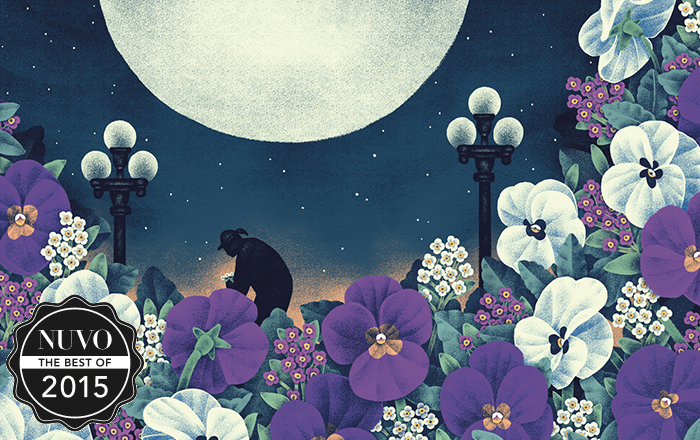A Case for Spring Cleaning
Achieving inner peace.

Do you ever feel the need—not the desire, but the need—to clean? That unexpected surge of energy willing you to sort, to tidy? An energy that has to cull, to discard, to toss out? Suddenly, floors that have been perfectly adequate for years must gleam. Drawers that have stymied you each time you search for socks must be organized, colour-coded, faultless. Shelves that explode with the pharmaceutical debris of decades hover in your mind before sleep. Curtains look sad and dusty, stacks of paper stalk you, cupboards harbour teapots unused in years, but that cry out now, right now, for stain removal.
You are in search of the spotless.
That need is most often associated with the ritual we call spring cleaning. In cold climates, spring cleaning logically followed months of keeping houses tightly closed to preserve warmth in winter. Air grew fetid during those endless, dark days and nights, wood smoke and coal dust and lamp-oil fumes crept into fabrics and furniture, bedding grew stale, cooking odours permeated clothing and curtains. By the time the first mild breezes blew, the need to clean, to air out, to beat rugs and wash walls was truly that—a need.
Today, we are a society possessed by cleaning products. Our homes are heat-pumped, air-filtered, central-vacuumed; our cooking fumes and wood smoke fanned away. Our clothing is laundered and dry-cleaned regularly, and we no longer struggle in the dark depths of February with bedsheets frozen solid to ice-coated clotheslines. We eliminate pollens and particles from our air and we wage war on the insidious dust-mite. We are a clean people, year-round. So why, in spring, do we feel the compulsion to…clean?
But the compulsion comes not only in spring. The spring cleaning mood can hit you at any time: the first clue that the urge for order may not exist simply on the material level. The closets of our souls get as cluttered as those in our homes and the need to tidy up our psyches—or at least do some sorting—can be the basis of an obsession with orderliness.
But the compulsion comes not only in spring. The spring cleaning mood can hit you at any time.
“The need to sort may often represent an inner conflict,” says Montreal Jungian analyst Françoise Cloutier. “Every time we repress something, be it good or bad, we are putting it away inside. We hide it, we don’t want to look at it.” Sounds suspiciously like my ill-named walk-in closet.
“These things we repress have value,” Madame Cloutier continues. “The Self knows that. Sometimes when we have a sudden need to clean, it is the Self that needs to organize. It is a message from the unconscious.”
“You mean,” I ask, “when I have an overwhelming need to sort the kitchen utensil drawer, or to iron clothes with pleats at three in the morning, my unconscious is trying to tell me something?”
She laughs. “Sometimes, yes. What has been hidden inside, the unconscious may be asking ‘Do we want it? Do we still need it? Should we clean it off and use it? Should we throw this out now?’ This gives us psychic energy—sometimes for a major change.”
But how does cleaning help that process? “If you deliberately clean something, sort it, put it in order, you often have a sense of peace afterwards, a sense of accomplishment. It is like a hope that you can do it within.”
Spring cleaning urgency possessed me last October. It lasted an entire month, and I was helpless in its grasp. My normal, placid rhythms were overwhelmed by what felt like a demon of efficiency: no corner, no cupboard, no crevice was spared. I folded, sorted, washed and discarded; I donated clothing and held a massive, two-day garage sale. Old paint cans, papers, pillows flew through my hands as if alive. Pantry shelves, tool shelves, spice shelves—all were labeled, arranged, rearranged. I could not stop my Self.
The summer before, my mother had died. The culling of possessions that happens after the death of someone dear is a dark task. Each object must be examined, remembered, weighed on a scale more emotional than practical. Things taken for granted over the years are suddenly invested with new meaning: that my mother loved a particular cup made it special, impossible to give away. There were also those “entwined” items, where her memories and mine were linked in special ways, small pieces of my past and hers that she had carefully preserved, that I had not even known about. A shoebox held my letters to her, small mementoes from my early childhood; in a drawer, still in its original box, was the necklace I had so proudly given her the summer I turned nineteen.
“Yes, this is a painful process,” says Françoise Cloutier, “but it helps the grief. It brings memories, it connects you with forgotten feelings. It forces you to go deeper into your unconscious than just the personal layers…it is also the familial unconscious. You must make peace with the far past.” Peace with the far past. Is that what I was doing last October? Having sorted through my mother’s last, small home, those compact rooms that held the remainder of her life’s cullings, did I need to reassess my half-lifetime of flotsam and jetsam? Clearly I did. It surprised me, the things that no longer mattered once the cleaning demon was upon me. I looked with indifference at books I once believed would be with me my entire life; objects imbued with sentiment and memory were silent. Things I had held onto, certain that someday they would find a new purpose, were exposed for what they were: past their prime. Their time with me was over, there would never be a time when I would need them. Best give them to someone who did. And so at the end of that warm October, I had dispossessed myself of a great many things. I had freed space, let in light. I had ordered what remained and could find what I truly needed. And oddly, I did feel at peace.
________
Never miss a story. Sign up for NUVO’s weekly newsletter here.








